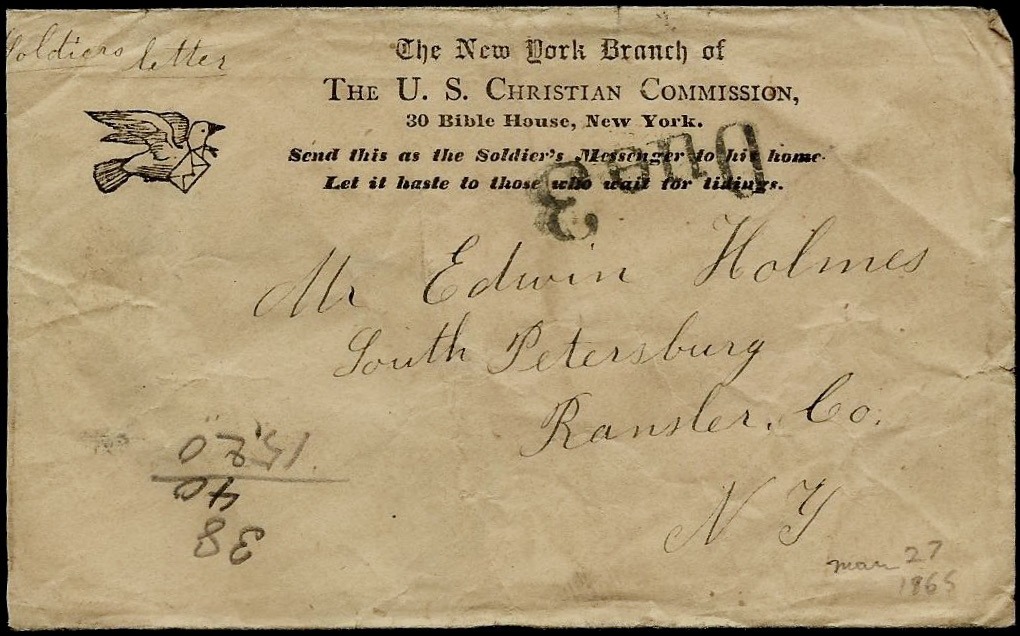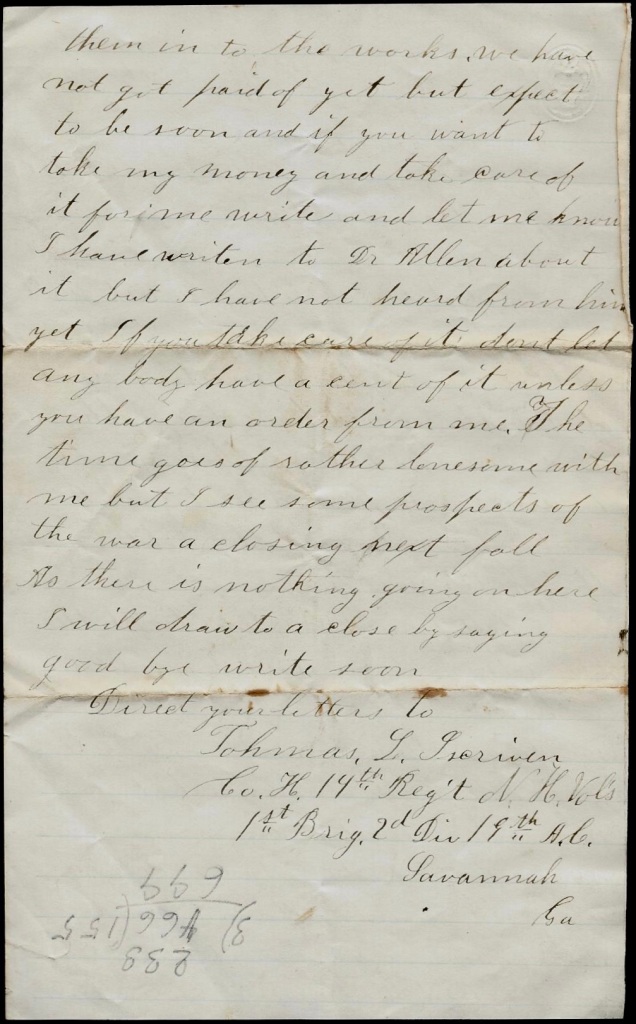The following letter was written by Thomas L. Scriven (1840-1904), the son of Joseph and Nancy Scriven of Rennsselaer county, New York. According to census records, Thomas was born in New York State so how he came to enter the service for the State of New Hampshire remains a mystery though the records of that regiment may provide us with a clue. According to the muster rolls of Co. H, 14th New Hampshire—the company in which Thomas served—he was born in Canada. My hunch is that Thomas went to Canada to avoid the draft and then decided later to enter the war as a substitute, for which he would receive a $300 or more bounty. He entered the 14th New Hampshire on 30 July 1864. He mustered out of the regiment at Savannah in July 1865.

Thomas wrote the letter from Savannah which he termed “a mean place.” To understand why he might say so, we turn to the regimental history which informs us that, “When the Fourteenth entered Savannah, Sherman’s army was leaving it; the inhabitants bitterly hating the ‘Yankee bummers.’ The city was in a peculiar condition. Terror, hate, foreboding, were sentiments which predominated among the inhabitants at first. The civil government was entirely superseded: the city was taken entirely out of the hands of its inhabitants, and was governed by military officials throughout…Not a citizen of Savannah had a store or shop open: the trading was all done by permits from the commanding general; business of every kind was dead; and the railroad communication had been destroyed by Rebel and by Union troops, from opposite motives…The Fourteenth was at once assigned tp provost-duty…[The regiment was] quartered in a building in the heart of the city until the last of February when it went into camp in stockaded A tents, in a railroad cotton-yard west of the city. It was also relieved of all special duty in the city at the same time.”
The most disturbing sentence in Thomas’s letter reads as follows: “Our folks are building a fort through a grave yard and digging up the dead bodies and throwing them into the works.” The regimental history states that the 14th New Hampshire were put to work in March 1865 rebuilding the Confederate breastworks that were east of the city about two miles. One of the forts in this line of works was Fort Brown which happened to be near the Catholic cemetery, established in 1853. (see Hillcrest Abbey Roman Catholic Cemetery near Skidaway Road and East Gwinnett Street). The website of this cemetery informs us that “after the surrender of the city on November 23, 1864. Sherman ordered fortifications to be built, a project which removed cemetery fences, leaving it open to vandalism and theft. During this time many graves were desecrated by troops. The Sisters of Mercy, with the assistance of local women, rescued the remains of two bishops, two priests, and four sisters. It was only in 1867, after Bishop Augustin Verot urged President Andrew Johnson and Edwin M. Stanton (Secretary of War) to restore the Cemetery to its former state, that they were reinterred.”

Transcription

Savannah, Georgia
March 27, 1865
Friend Edwin,
I am as well as usual and I hope this sheet will find youy the same. Please write and let me know how town meeting went off. I wish I could have been there to seen [it].
The 24th of this month I saw some peas about eight inches high. Some of the soldiers think the war is going to close next fall. I have written two letters before this to you and I would like to know the reason why you do not write a letter to me. I like to be a soldier well enough but I do not like shouldering arms quite so well.
This is a mean place. Our folks are building a fort through a grave yard and digging up the dead bodies and throwing them into the works. 1
We have not got paid off yet but expect to be soon and if you want to take my money and take care of it for me, write and let me know. I have written to Dr. Allen about it but I have not heard from him yet. If you take care of it, don’t let anybody have a cent of it unless you have an order from me.
The time goes off rather lonesome with me but I see some prospects of the war a closing next fall . As there is nothing going on here, I will draw to a close by saying goodbye. write soon.
Direct your letters to Thomas L. Scriven, Co. H, 14th Regt. N. H. Vols, 1st Brigade, 2nd Division, 19th Army Corps, Savannah, Georgia
1 The only possible reference to the construction of a “fort” or “works” in or near Savannah in March 1865 appears on page 332 of the Regimental History by Francis H. Buffum. It reads, “On the 21st [March], fatigue-details from the regiment began work on the defenses two miles east of the city. The immense half-moon breastworks of the Rebels were deemed inadequate, and a desperate attempt to recover Savannah to the Confederacy was among the possibilities to be provided for.”


